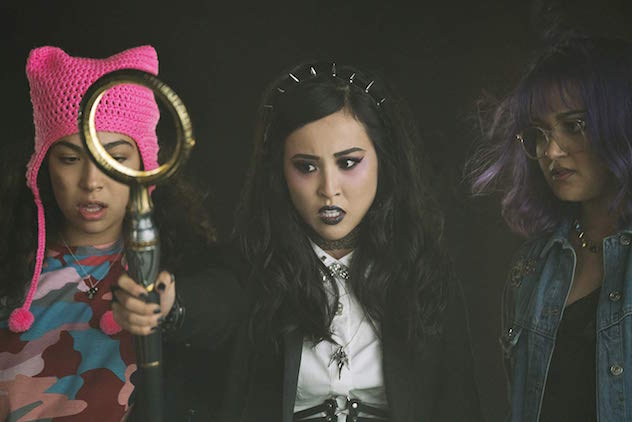There’s a hard reality in Hollywood that creators, studios and fans alike must acknowledge: All dollars aren’t the same. Box office earned in the early part of a film’s release, especially the all-important opening weekend, is worth far more than money that comes in later in the run. More than any other industry, the business of movies is about expectations. Meeting your projected first-weekend total, or exceeding it, means that there’s “heat” on your picture — pent-up demand that gives theater owners and distributors comfort to extend the run longer, or even expand it to more screens. Missing it can lead to vital promotional dollars being pulled in favor of more buzzworthy titles.
That’s why an idea that germinated in July, at a gathering of Asian American tech, media and finance leaders at the beloved Los Altos, California, restaurant Chef Chu’s, was so unexpectedly disruptive. The meetup, organized by a loose networking confederation that goes by the name “Gold House,” was intended to introduce the group to the creators and stars of one of Warner Bros.’ biggest summer gambles — Jon M. Chu’s big-screen adaptation of the best-selling book “Crazy Rich Asians.”
Bing Chen, a serial entrepreneur who cut his teeth as head of YouTube’s global creator initiatives, remembers the conversation rapidly turning from how important the film was — after all, it had been a quarter century since a Hollywood studio produced a film featuring an English-speaking all-Asian cast! — to what it would take to make “Crazy Rich Asians” a hit.
“We knew that the film was great,” he says. “And we realized that if we could ensure it was successful, it could be our Trojan horse into the culture — a way to open the gate for an avalanche of films from and featuring our community.”
The network had already experimented with lending support to Asian American productions. The prior year, Gold House members had bought out a number of first-weekend showings of Justin Chon’s critically acclaimed indie film “Gook,” helping the film score over $250,000 at the box office, not a bad showing for a film that cost $50,000 to produce.
But a $30-million studio film like “Crazy Rich Asians,” releasing on thousands of screens across the nation, was a challenge of an entirely different scale. To guarantee a big opening would take more than just a few deep pockets — it would require the creation of a viral phenomenon.
Fortunately, the Gold House circle included notables whose entire careers were based on brilliant leveraging of the network effect, including Kevin Lin, the then-chief operating officer of Twitch; Maggie Hsu, former chief of staff at Zappos; Rotten Tomatoes co-founder Patrick Lee; early Facebook employee Alex Wu, who had gone on to found the A3 Foundation, a nonprofit seeking to elevate Asian American creators in American media; and Chen himself.
Inspired by the actions of African American business and entertainment leaders during the release of “Black Panther” — “Every step we take is in the footsteps of black Americans,” notes Chen — they decided to do targeted buyouts of theaters across the nation and, ultimately, around the world, linked together by a common hashtag: #GoldOpen. “Gold” for Gold House, but also for the precious metal, the color of victory and, as a form of semantic recapture, the stereotypical color of East Asian skin. “Open” was for opening weekend, but also to complete an internal entertainment-industry pun: A “cold open” is a scene that takes place in a TV show or movie before the opening credits even roll, generally used to warm the room with a quick-flash laugh or to ensure immersion into a story by sharing critical context about the characters and world in which it will take place. Cold opens are scene setters, to whet the appetite and ensure proper framing for the main meal of the show. A Gold Open would do the same for “Crazy Rich Asians.”

Bing Chen, third from left, with Asian American community leaders and “Crazy Rich Asians” stars. Left to right: Harry Shum Jr., Jimmy O. Yang, Chen, Henry Golding, Gold House member Janet Yang, CAPE Executive Director Michelle Sugihara, Olympian Alex Shibutani, Selena Tan, Janice Koh. (Courtesy photo)
“We realized that theaters cost about $1,200 to $5,000 to buy out,” Chen says. “We were able to find dozens of people who were willing to buy out screenings on the first weekend, putting up anywhere from hundreds of dollars to $15,000 — we had quite a few at $15,000. But the key wasn’t just to have the buyouts — it was to make it a social challenge. To turn, in Jon Chu’s words, a ‘moment’ into a ‘movement.’”
As the hashtag spread, others jumped on the bandwagon: athletes — NBA star Jeremy Lin and Olympic figure-skating siblings Alex and Maia Shibutani; performers ranging from “Iron Fist”’s Jessica Henwick to K-pop artist Eric Nam and “Mythbusters”’ Grant Imahara; and members of the film’s own cast like Harry Shum Jr. and Jimmy O. Yang.
When the dust settled, even before the film’s official opening weekend, over 350 theaters had been pre-purchased and packed, representing nearly half a million dollars in box office. The expanding hashtag was picked up by media like CNN and Forbes, and drew endorsements from non-Asian celebrities ranging from “A Wrinkle in Time” filmmaker Ava DuVernay and “Jurassic World’”s Chris Pratt to “Big Little Lies”’ Reese Witherspoon and “Master of None”’s Lena Waithe, as well as social media mega-influencers like Justin Bieber and “Hamilton”’s Lin-Manuel Miranda (although the latter two were undoubtedly inspired to chime in based on their status as once and future collaborators of director Chu, respectively). It almost wasn’t a surprise when the film’s staggering first-weekend box office take was announced: $34 million, more than 25 percent above “The Meg,” the next biggest-grossing movie, and the best opening for a romantic comedy in nearly a decade.
Even more inspiring: A few weekends later, when the Sony techno-thriller “Searching” hit theaters, directed by Aneesh Chaganty and starring Korean American screen icon John Cho, it too received a #GoldOpen boost, with Jon Chu and Henry Golding doing their share to pay the fortune forward by buying out multiple screenings.
“Our people historically do not support each other,” says Chen, noting that the inherent diversity of the Asian American community sometimes served as an obstacle to cross-ethnic collaboration. “This was a milestone. We saw a level of mutual support that we’ve never seen before in our community. African Americans did first weekend clubs in the late ’80s. Women did it in the 2000s for films like ‘Sex and the City.’ But Asian Americans have never organized like this before, and we were able to do it back-to-back.”
But is buying out theaters simply gaming the system? And if so, how long can the game continue?
“Doing this is not cheating,” Chen says. “To even think that way is to think through a colonialist, imperialist lens. We’re merely leveraging the strength that we have, to counter the way that we’ve been locked out of the system in the past. Our stars, our movies, our talent has been sitting in the mainstream’s blindspot for so long. We can see it because we’re seeing it through different eyes. We’re making sure they can see it too.”
As for how long the #GoldOpen hashtag can make it rain, Chen thinks it can continue indefinitely, until it’s no longer necessary. “We can do this again and again, for every Asian American film that comes out,” he says. “We have companies whose executive leadership and Asian American employee groups are committing to buy out a minimum of four different films next year, made by Asian American filmmakers and starring actors of Asian descent. We’re getting international partners on board, too. We had #GoldOpen buyouts happen in the U.K., in Hong Kong and in Taiwan. And we’re pushing to get Asian Americans to #GoldOpen other multicultural films as well.” — black, Hispanic, LGBTQ.
Ultimately, Chen wants to see this kind of early and strong demonstration of support from Asian Americans expand beyond films to TV shows, books and even startups. “We know the supply has always been out there, as far as diverse talent, ideas, creativity,” he says. “What we’re trying to do is get people to see that demand is there, too.”
Everything mainstream began as something niche, he notes. “Look at hip-hop; it started as guys selling cassettes out of the backs of their car trunks,” he says. “But once a culture’s work starts getting seen beyond the neighborhood, it takes on a life of its own. That has a huge impact on how a community is perceived. And perception ends up driving how people behave in reality. Barack Obama wasn’t the first black president. There was a black president in the movie ‘The Fifth Element’ — and he was president of Earth, not just the United States. There was Dennis Haysbert on ‘24.’ Perception controls who gets to be in the Oval Office. Who gets to buy a wedding cake. Who gets to come into your country, and who gets to stay. If we can shift people’s perceptions, we can change the world.”
This article appears in KORE’s October 2018 issue. Subscribe here.







